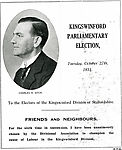 Election address (front)
Election address (front)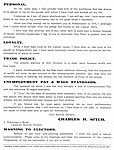 Election address (back)
Election address (back) Protest against cuts in unemployment benefit
Protest against cuts in unemployment benefit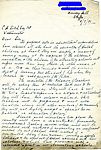 Protest against cuts in teachers' pay (a)
Protest against cuts in teachers' pay (a)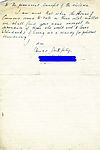 Protest against cuts in teachers' pay (b)
Protest against cuts in teachers' pay (b)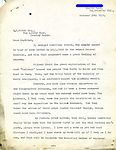 Support for Charles following defeat (a)
Support for Charles following defeat (a)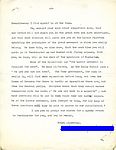 Support for Charles following defeat (b)
Support for Charles following defeat (b)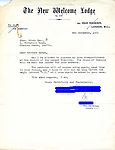 More support
More support

Charles' defeat came after thirteen years as Labour M.P. for Kingswinford. He lost his seat, along with many other Labour M.P.s as a result of an "Economic Blizzard", that swept away the Labour Government in 1931. The election address and letters reproduced here give some insight into the political and economic situation at the time.
A minority Labour Government was elected in May 1929. Worldwide depression followed the Wall Street Crash in October of that year. British exports fell by half. Unemployment rose from 1.1 million in November 1929 to 2.5 million in December 1931. Tax revenue fell, and the cost of unemployment rose, from £12 million in 1928 to £125 million in 1931. European banks collapsed in May 1931 causing the loss of more British investments. The Government was faced with an urgent need to balance the budget.
The proposed solution to the economic crisis split the Labour Cabinet. The Chancellor demanded a 10% cut in unemployment benefit and in the pay of public servants. Unable to get agreement, the Prime Minister, Ramsay MacDonald, offered the Government's resignation. He stayed on to lead a National Government, with the agreement of the Conservatives and Liberals. Very few of his Labour colleagues followed him.
Some thought MacDonald's actions were brave. Others, particularly in Labour circles, believed him to be a traitor to his party. Charles does not state his opinion openly in his election address, but it is possible to read between the lines. He talks of his own pledge and loyalty to the Labour Party, and refers to faith in some men being shaken.
It is clear from the address that Charles was opposed to the cuts in benefit and public service pay. The Museum holds many dozens of letters written to Charles urging him to fight against the cuts. Two are included here for you to read, one from the Amalgamated Egineering Union, the other from a constituent warning of the damaging consequences for education, of a cut in teachers' salaries.
The last two letters are examples of the many Charles received, following his defeat. They express support and hopes for a speedy return to Westminster. Charles was not returned at the 1931 election, and later events led him to withdraw from public life altogether.
Rollover the captions in the box to see the available images in thumbnail format, click the caption to see the full-size image
| Reference: | 646 |
| Keywords: | |
| Archive Ref: | 2007/001/0001 |
| Updated: | Mon 12 Mar 2007 - 0 |
| Interpretation written by | Barbara Harris |
| Author's organisation | |
| Organisation's website |